I’ve been blessed to participate in a class discussing the parables that Jesus was reported to share in the gospels of the New Testament and Thomas. I was frankly a little concerned at first that this would be my cup of tea, but in fact, have found the practice of “exegesis” or analysis/interpretation of these stories to be quite profound and valuable.
I wrote a paper on the parable of the mustard seed and thought I’d share some of that here as it holds a lesson for all of us as we work through this liminal time between the crumbling and decay of our current world and the hoped-for and worked for redemption and re-creation of a new way of being.
The parable of the mustard seed appears in all three of the synoptic gospels:
How shall we compare the kingdom of God, or with what parable might we put it? It is like a mustard seed, which, when sown upon the ground, the smallest is of all the seeds on earth. And when sown, it rises up and becomes the greatest of all vegetables, and it makes large branches, so that are able under its shadow the birds of the heaven to dwell. Mark 4.30–32 (NRSV)
Like is the kingdom of the heavens to a mustard seed, that taking, some person sowed in his field. The smallest, on the one hand, it is of all the seeds, but when it has grown, greatest of the vegetables it is, and it becomes a tree, so that when come the birds of the heaven, even they dwell in its branches. Matthew 13.31–32 (NRSV)
To what is like the kingdom of God, and to what should I make it like? It is like a mustard seed, which taking, a man casts in his garden, and it grew, and became a tree, and the birds of the heaven dwelled in its branches. Luke 13.18–19 (NRSV)
It is also found in the Gospel of Thomas:
He said to them, “It is like a mustard seed. < It > is the smallest of all seeds, but when it falls on prepared soil, it produces a large plant and becomes a shelter for birds of heaven.” Thomas 20.2-4
We can look at many possible interpretations of this parable, but let’s consider the possibility that Jesus’ lesson was meant to point to the way a common medicinal herb, though the seed is very small when planted in the fertile ground can become a shelter for many creatures.
Perhaps His message was simply that even the most humble and unimposing beginning has the unlimited potential to grow into a place of sanctuary for the most vulnerable among us.
In His ministry, as he was speaking to an audience of the poor and outcast, the message may well have been that they held responsibility for recognizing and acting upon that potential. That even though they came from humble means, they were still of great value medicinally and as an added spice for the sustenance of the message Jesus sought to share. That with that recognition came the responsibility to thrive and grow into a beautiful and protective plant or community that gave sanctuary to all of God’s beloved creatures, both human and more-than-human.
I like this interpretation in its simplicity and its value as a message for our times.
Many of us are feeling the despair and frustration of witnessing the suffering of our planet and our marginalized siblings in these apocalyptic days. That frustration and despair are often accompanied or caused by our feeling that we are too insignificant to make any real change or to arrest the seemingly inevitable destruction.
In this lesson, Jesus offers us the message that even a tiny seed has the potential to grow into a place of refuge. If we take that message seriously, we have the opportunity to manifest that power in our lives by trusting that even our smallest efforts may ripple out and grow into something large enough to afford sanctuary, change, and redemption for our earth and our beloved communities.
My beloveds, consider this possibility.
We have the capacity to hold that potential like the tiny mustard seed in our hearts with faith that it will guide us toward the small work in each moment that will result eventually in vast and comprehensive change toward a new reality – even as we accept that like any tree we plant, we may never harvest the fruit in our lifetimes. By holding that potential with love, compassion, faith, and power we can fulfill the promise Jesus gave us with this parable and truly make a difference to our world and to the world of our children and our children’s children.
May it be so.

So wonderful to read your words and heart inspirations dear Wakil. The parable is one of the oldest and powerful of teaching tools, and the depth and variations of so many of the parable used throughout time is the very reason they have such power and wisdom. The insights you touch upon from the mustard seed image is a worthy and valuable piece of wisdom for all, a sweet variation of this parable.
Thank you, my dear friend and teacher. My Master’s program class on parables has surprised me with its depth and insights. I expect I’ll post more of these.